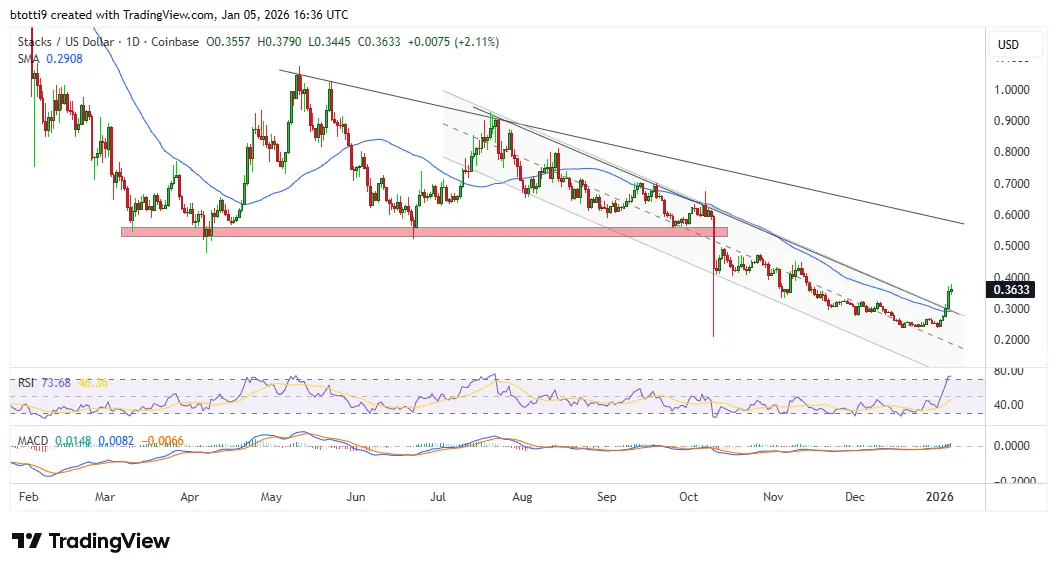STX
$ 0.2568 USD
$ 0.2568 USD
$ 474.07 million USD
$ 474.07m USD
$ 19.13 million USD
$ 19.13m USD
$ 282.452 million USD
$ 282.452m USD
1.8146 billion STX
Blockstack-related information
Issue Time
2019-07-15
Platform pertained to
--
Current coin price
$0.2568USD
Market Cap
$474.07mUSD
Volume of Transaction
24h
$19.13mUSD
Circulating supply
1.8146bSTX
Volume of Transaction
7d
$282.452mUSD
Change
24h
-3.83%
Number of Markets
280
Github Messages
More
Warehouse
Blockstack
Github's IP Address
[Copy]
Codebase Size
94
Last Updated Time
2020-10-29 15:27:43
Language Involved
--
Agreement
--
Crypto token price conversion
Current Rate0
0.00USD
STX Price Chart
Blockstack introduction
 Markets
Markets3H
-1.54%
1D
-3.83%
1W
-15.56%
1M
-33.14%
1Y
-73.5%
All
-31.84%
| Aspect | Information |
| Short Name | STX |
| Full Name | Stacks Token |
| Founded Year | 2018 |
| Main Founders | Muneeb Ali and Ryan Shea |
| Support Exchanges | Binance, Kucoin, OKEX, Huobi, etc. |
| Storage Wallet | Stacks Wallet, Ledger, Trezor, etc. |
Overview of STX
The Stacks Token (STX) is a type of cryptocurrency that was founded in 2018. Its short name is STX and was founded by Muneeb Ali and Ryan Shea. STX tokens are used as fuel for smart contracts, digital asset transactions, and other operations within the Stacks 2.0 network, a layer-1 blockchain solution that extends the utility of Bitcoin and enables decentralized apps and smart contracts.
Notable exchanges supporting STX include Binance, Kucoin, OKEX, and Huobi among others. As for digital wallet storage, the Stacks Wallet, Ledger, and Trezor are some of the platforms that can store STX tokens.
Pros and Cons
| Pros | Cons |
| Extends the utility of Bitcoin | High dependence on Bitcoin's network |
| Enables decentralized apps and smart contracts | Relative complexity in understanding Stacks 2.0's technology for new users |
| Supported by notable exchanges | Market volatility risk |
| Flexible storage options (Stacks Wallet, Ledger, Trezor) | Risk of losing tokens if wallets are not properly secured |
STX Price Prediction
Over the coming decades,STX's price is expected to experience fluctuations. By 2030, the trading range is projected to be between $1.42 and $2.38.In 2040, our forcast suggests STX could reach a peak price of $8.74,with a potential minimum around $1.42.Looking ahead to 2050, technical analysis indicates that STX's price could range from $2.79 to $5.23,with an estimated average trading price of about $3.11.
What Makes STX Unique?
The Stacks Token (STX) primarily differentiates itself by its innovative integration with the Bitcoin Blockchain. While many cryptocurrencies operate on standalone blockchains, STX takes an unprecedented approach to utilize the secure and robust Bitcoin Blockchain to widen its utility beyond a mere store of value. Its unique design allows the addition of smart contracts and decentralized apps (dApps) directly on Bitcoin's network, without necessitating any changes in the Bitcoin core software.
The Stacks 2.0 network, powered by the STX token, forms a critical component of this innovation. Functioning as a layer-1 blockchain solution, Stacks 2.0 provides a protocol for dApps and smart contracts to run on Bitcoin's network. It employs a novel consensus mechanism called the 'Proof-of-Transfer' or PoX that recycles Bitcoin's computational power, working in symbiosis with the Bitcoin blockchain and unlocking a suite of functions not directly coded in Bitcoin.
However, the approach undertaken by STX's design is not without challenges. Its heavy dependence on Bitcoin's network infrastructure means that any issues or significant alterations to the latter can impact the STX token and its associated operations. Moreover, the technology employed by Stacks 2.0 could be deemed complex for newcomers to the cryptocurrency world.
Comparatively speaking, this framework for layer-1 solutions over existing blockchains, especially with a dominant one like Bitcoin, sets STX apart from many other cryptocurrencies that focus on functioning as standalone digital currencies or utility tokens within an isolated ecosystem.
How Does STX Work?
The working mode and principle of the Stacks Token (STX) revolves around the Stacks 2.0 blockchain, which is designed to work in conjunction with the Bitcoin network. It operates on a unique consensus mechanism known as Proof-of-Transfer (PoX).
With traditional Proof-of-Work (PoW) or Proof-of-Stake (PoS) mechanisms, miners would perform computations or stake a significant amount of their tokens to add new blocks to the blockchain. However, in the PoX mechanism, miners transfer Bitcoin (BTC) to other participants of the network to mine new STX tokens and add blocks to the Stacks 2.0 blockchain. This recycling of Bitcoin's PoW is a core component of the PoX mechanism, allowing STX to secure itself with the powerful and robust security of the Bitcoin network, while also extending Bitcoins utility by enabling smart contracts and decentralized applications (dApps) on the Bitcoin network.
Within the Stacks 2.0 network, STX tokens serve multiple purposes. They are used as 'fuel' for executing smart contracts, making digital asset transactions, and conducting other operations on the network. STX token holders can also 'stack' their tokens in a recurring cycle to participate in the Stacks network consensus, earning Bitcoin rewards in return.
Exchanges to Buy STX
Stacks Token (STX) is supported by various cryptocurrency exchanges providing a range of transactions with diverse currency pairs. Here we list 5 of the major exchanges that support the buying of Stacks Token(STX).
1. Binance: One of the world's largest and most popular crypto exchanges, Binance supports the STX/BTC, STX/ETH, STX/USDT, and STX/BUSD trading pairs.
2. Kucoin: Kucoin includes STX in its offering with trading pairs like STX/BTC and STX/USDT.
3. OKEx: OKEx exchange offers traders the ability to transact STX against multiple pairs like STX/BTC, STX/ETH, and STX/USDT.
4. Huobi: On Huobi exchange, users can buy STX tokens with pairs such as STX/BTC, STX/ETH, and STX/USDT.
5. Bithumb: The South Korea-based exchange offers the STX/KRW trading pair, enabling direct transactions with the South Korean Won.
How to Store STX?
Storing Stacks Tokens (STX) involves holding them in a digital wallet that supports this particular type of cryptocurrency. These wallets can vary in their form and type.
Primary options for storing STX tokens include:
1. Desktop Wallets: These are software applications that you can download and install on your personal computer. The Stacks Web Wallet, developed by Hiro, is a prime example of a desktop wallet. Designed specifically for STX, it allows users to manage their tokens securely from their desktop.
2. Hardware Wallets: For those seeking an additional layer of security, hardware wallets can be a good choice. These are physical devices that hold your cryptocurrency offline, making them less susceptible to hacks. Popular hardware wallets that support STX include Ledger and Trezor.
3. Mobile Wallets: For those seeking convenience and access on-the-go, mobile wallets are ideal. They are applications installed on your phone, so you can carry your digital assets anywhere. One such wallet that supports STX tokens is BOLOX, a mobile-first wallet that provides a user-friendly interface for managing STX.
4. Web Wallets: These are wallets accessed through web browsers. They facilitate quick access to your assets from any device with an internet connection. The Stacks Web Wallet also falls into this category, as it can be accessed via a web browser.
5. Paper Wallets: These are physical documents that contain your public and private keys in a printed form. They are safe from digital attacks as they are completely offline and physical but can be less convenient to use. Currently, there are no specific paper wallets for STX, and they are generally less common for newcomer-friendly tokens.
Should You Buy STX?
The Stacks Token (STX), with its innovative design and features, can attract a variety of potential buyers from different backgrounds. Here is a brief analysis:
1. Cryptocurrency Enthusiasts: People interested in cryptocurrencies and blockchain technology might find STX appealing due to its unique integration with Bitcoin and enabling of smart contracts and dApps on the Bitcoin network.
2. Investors: Those seeking to broaden their investment portfolio with digital assets may consider STX due to its presence on notable exchanges and the potential growth of its utilities. However, like any investment, it is subject to market volatility and should be approached with understanding and caution.
3. Developers: Developers interested in creating decentralized applications (dApps) and smart contracts on the Bitcoin network could be drawn to STX because the Stacks 2.0 blockchain supports these functionalities.
4. Partners of the Stacks Ecosystem: Participants in the Stacks ecosystem, such as app developers and start-ups who utilize the Stacks blockchain for their projects, may find utility in owning and transacting with STX tokens.
STX Good investment market
- 1
- 2
- 3
- 4
Blockstack User Reviews
Blockstack News
TokenStacks price forecast: STX channel breakout points to retest of $0.56
Stacks price rose 12% to near $0.38 as Bitcoin flipped green.The layer-2 token could surge to $0.56
2026-01-06 02:02

TokenStacks Ecosystem Funding: Ambitious SIP-031 Proposal Seeks STX Endowment
The Stacks ecosystem, a pioneering layer-2 solution bringing smart contracts and decentralized appli
2025-05-30 22:04

TokenSTX price jumps 16% as traders brace for reversal, RSI hits 74
Coinglass shows a long/short ratio of 0.95, indicating bearish sentiment.STX could fall to $0.47 if
2025-04-25 23:04

TokenStacks Activating Nakamoto Upgrade In 8 Days, Will STX Break $2?
Stacks Network, the Bitcoin layer-2, is one of the largest DeFi protocols on the worlds most secure
2024-10-22 16:04

Token3 Altcoins to Consider Selling Now: PYTH, KAS, and STX
Pyth Network (PYTH), Kaspa (KAS), and Stacks (STX) are flashing bearish signals in the current marke
2024-10-02 23:16

TokenAltcoin Price Action Explained: STX, WIF, TON, SUI, PEPE
Altcoins $STX, $WIF, $TON, $SUI, and $PEPE with their price ricochets have been swaying investor sen
2024-09-28 17:22

TokenSTX Faces Bearish Pressure as Stacks Launches Nakamoto Upgrade
Stacks Begins Nakamoto Upgrade Amidst STX Token Decline.STX Faces Pressure as Stacks Launches Nakamo
2024-08-29 21:47

TokenDaily Market Review: BTC, ETH, XRP, TON, STX
The bears in control in todays session, as seen from the increase in the global market cap. The tota
2024-08-08 19:06

TokenBitcoin (BTC) Bounces Above $67K, Stacks (STX) Skyrockets 10% Daily (Market Watch)
After a substantial price decline that drove it to a weekly low of under $64,000, bitcoin has recove
2024-07-26 18:03



8 ratings